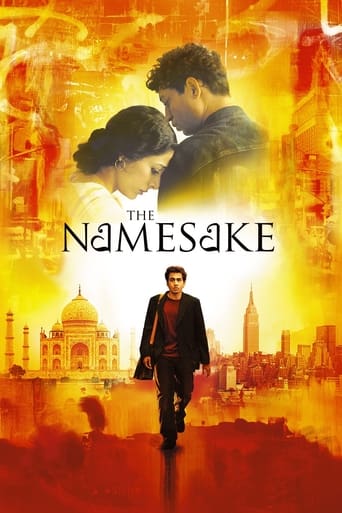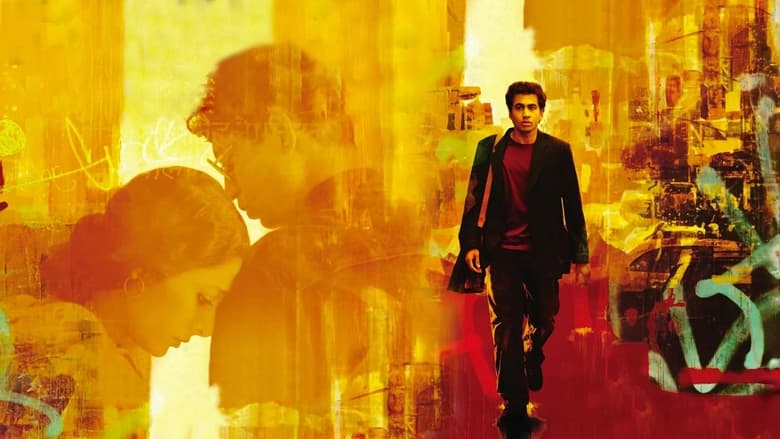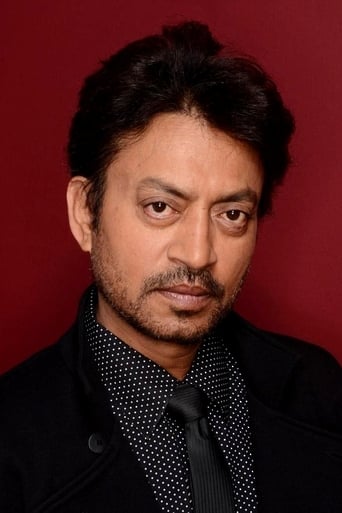

 Watch Now
Watch Now







The Namesake (2006)
 Watch Now
Watch Now







After moving from Calcutta to New York, members of the Ganguli family maintain a delicate balancing act between honoring the traditions of their native India and blending into American culture. Although parents Ashoke and Ashima are proud of the sacrifices they make to give their children opportunities, their son Gogol strives to forge his own identity without forgetting his heritage.
Watch Trailer
Cast


Similar titles
Reviews
If you don't like this, we can't be friends.
Easily the biggest piece of Right wing non sense propaganda I ever saw.
One of the worst ways to make a cult movie is to set out to make a cult movie.
The tone of this movie is interesting -- the stakes are both dramatic and high, but it's balanced with a lot of fun, tongue and cheek dialogue.
As a daughter of two immigrant Indian parents, I could perfectly identify myself with the main character: the inner struggles during high school to fit in the Western world while realizing you cannot change your roots and culture. This movie was a huge eye opener to me, and many others who grow up in two different cultures and the most beautiful part is the realization that there is no superior culture. One must accept and find out what matters most and only then one can be truly free and happy.
The Namesake reminded me of a really involving Chinese film released somewhere around the middle of the last decade; that of Yang Zhang's Sunflower, a film that balanced a family's plight over three-or-so decades of Chinese living as husbands and wives and mothers and sons to the central characters each interlocked across the good times; bad times; political times and times wherein natural disasters would strike and affect everyone. Here, Mira Nair's film, The Namesake, is a neat little drama additionally rearing off down similar routes of the expansive and of the all-embracing, specifically in its telling of the exploits of different generations of family members belonging to the same household as they strive to get by. In addition to this admirable approach, it will strike you as being thematically similar to Sarah Gavron's 2007 piece Brick Lane – a film released slightly later than The Namesake, but a film covering those of a Central Asian descent shifting to the Western world and getting caught up in the cultural clash-plus-traumas which appear to come with doing such a thing.At the centre of the piece is this idea based on identity and whom one is on top of where one belongs; something epitomised by a character who eventually becomes more prominent once he's grown up and into an adult. He dislikes his Christian name, a name his father gave him out of the fact it is the same as his father's favourite author, who was Russian – the boy adamant that he'll change it when he's finally able to. In a film about inter-racial relationships and cross continental living, as well as differing nationalities brewing up inside of a metaphorical pressure cooker, this idea of sticking to what you are or holding on to what you were given, encapsulated in this younger character and his wrestling with his own name, neatly epitomises Nair's hypothesis of the challenges with keeping true to where one came from, although at the same time balancing what a newfound locale and its culture come to expect of you.The film is no particular person's story, more-so it is an instance in which the director has gone on to try and depict an entire family through two generations. Credit is due to Nair, who opts for a brave and grandiose approach to a story that might have been told simpler and not as well. We start with Bengali natives Ashoke Ganguli (Khan), and his bride-to be Ashima (Tabu); two people beginning in a poor but functioning locale in the late 1970s surrounded by outspoken locals and a train network which is, judging by the opening scene, a little less than particularly sturdy. Ashima and her family's money situation is not good; the coming into contact with Ashoke leading to their joining of one another in matrimony; their immigration to America the end result as Ashima escapes poverty and the humiliation of only being able to enjoy fleeting exposures to "Made in U.S.A." produce back in India, as opposed to being in amongst the core of such things now. Initially, the film's association with this woman drives proceedings; her dwelling in a place as different as New York is to India seeing her accidentally hot-wash her husband's jumper, whilst longing gazes outwards at the world from her dwelling's windows, as icicles hang from rafters and snow lies on the ground, alludes to the gulf in difference in regards to daily grind and climate.The film covers their rise through life as successes of varying ilks befall them, no less the births of Sonia (Sahira Nair) and Gogol (Penn); Gogol being that aforementioned character whose name it is syncs up with his father's favourite Russian writer. With Gogol's ascent into young adulthood comes the film's shift of principal focus from his mother, to him; the film shooting his arrival to this stage in his life with warm and welcoming tones seeing freshly mown lawns dotted around the estate within which they're based, as well as kids playing in the street, thus reiterating a sense of unity. One man is trying to fix his car in the vicinity - this is very much the sort of place in which broken items get mended rather than left out to rust and clutter the place up. In this regard, Nair rejects harder and more demeaning depictions of New York City and life inside of it; The Namesake a film persistently shooting its location as the warm and welcoming haven Nair takes it upon herself to construct it as, as if the place is constantly seen as this newfound Utopia the Ganguli's built their lives and that nothing could ever blot it. The film is a touching character study of people not native to a nation attempting to find solace with it as well as themselves; a film depicting such things with the tensions that brew up out of close-knit family set-ups making for the sort of feature length drama about people travelling great distances for a great deal of the time, in body as well as in mind.
Good movies are like wine-better as they age. I had enjoyed the movie so much on the first viewing (few salient scenes like Ashok making the call from the phone booth in an hospital corridor, was still fresh in the memory) I reviewed the movie again and relived Mira Nair's excellent story telling of Jhumpa Lahiri's book. This duo are few of the best talent that Non Resident Indian's (NRI's) have to offer. The story is binding like a good book. Both Irrfan Khan and Kal Penn stand out with their acting. There are better actresses than Tabu, who is not a Bengali-neither Irrfan Khan but he looks more like a Ganguly-who could have done a better job, but NRI directors neither see Indian films nor they are familiar with good talent or their views are skewed.) The screenplay is short and simple with sprinkling of Indian humor. Mira Nair, has a knack of narrating a story in short takes that has a lot of depth and at the same time keeps the story moving (like Ashima waving at Ashok or Ashok taking Gogol on the short pier, missing the camera or the time when Ashok gifts a book on Gogol's birthday) She doesn't dwell too much on a scene. Kal Penn, is one actor who really does a great justice to his part, where millions of teenagers can identify with-caught between cultures and identity. The ending is poignant. Two flaws by Nair-if she had skipped few scenes,this could have been a family movie instead of PG-13 and would fetched a wider audience. Two, the casting of Tabu and Moushami (the Robinson gal is not in the same caliber as the rest of the cast-she is fat and annoying). She could have easily casted Indian actresses. Still, All said and done, this is the best work of Mira Nair.
The story of an immigrant couple and dilemma of the second generation immigrants are well portrayed in the film in general sense. What makes the movie good is its universal language. You can replace Indian immigrants with Chinese, Turks, Romanian, Arabs or others, you can replace the US with England, Australia or else. The story's main lines won't change. An eye-catching characteristics of the movie is its little warm and memorable moments. Especially during the first quarter of the movie, while two main characters, Ashima and Ashoke introduced. This is a plus for movies itself, but little bit arguable for the story. They are like warm touches to a sensitive issue. It makes you feel sympathy for the characters (and immigrants) and wants you to take a side in the issue, while the story never touches to the other side of the coin such as adaptation and cultural problems of immigrants or conservative structure of their lives. The story focuses on a most typical issue on immigrants dilemma in the living countries; Their names: their identities. Which gives a clue from which culture, from which religion you are coming from. Something that sometimes you are proud of and something that sometimes you wish /have to change. Self-criticism is missing in the movie. However, the movie doesn't claim that it is discussing the immigrant issue as a whole. Based on personal experience of an Indian immigrant in the States. So we can forgive that flaw. The movies have the audience's attention easily, flows smoothly. A big plus for the film is it's reaching to its target without any difficulty; the western societies, which continuously welcome ten thousands of immigrant from every corner of the world. So it gives us an extra idea to understand immigrants better, who are clamped, stuck and lost between two lives, two cultures. Sometimes the film repeats its gender's clichés (shrinking clothing washed by Ashima; Ashima's saying she had been missing India for years, then now she would miss The US, etc) but we also see some original approaches like Ashima's memorable quote "Do you want me say 'I love you' like Americans." As for the cinematic structure of the film, personally I don't think that transition in Gogol's personality/life looks very well real. It seems to be little bit rushed. This is not actor's fault anyway. Other than this, Kal Penn's performance is strong. I find her wife's performance little bit overacted. Although we have seen Alex's parents very briefly, we have a good idea about their life style. On the other side, Gogol's parents life could be digged little bit more. The movie's music, cinematography and general atmosphere don't take any risk and follow the film grammar closely. We don't see any cinematic essay, original tricks, surprising editing or else (that's why the movie losses 2 point in my opinion) but we see a smooth, easily-read, nicely done movie. (that's why the movie gets 8 points)Overall: 8 over 10.January 2009, Montreal














